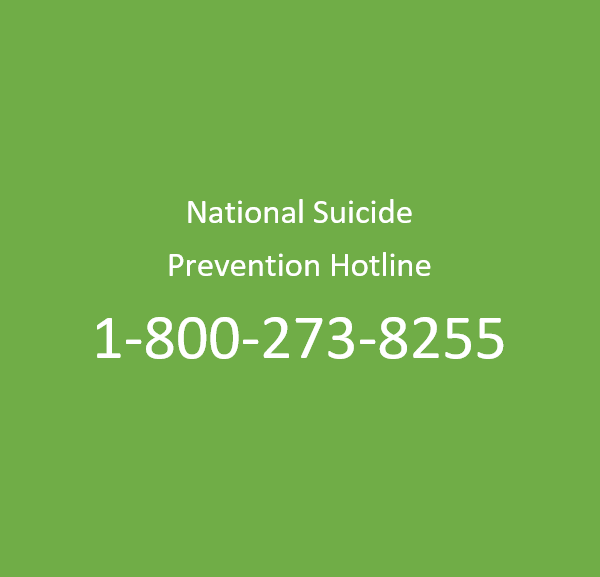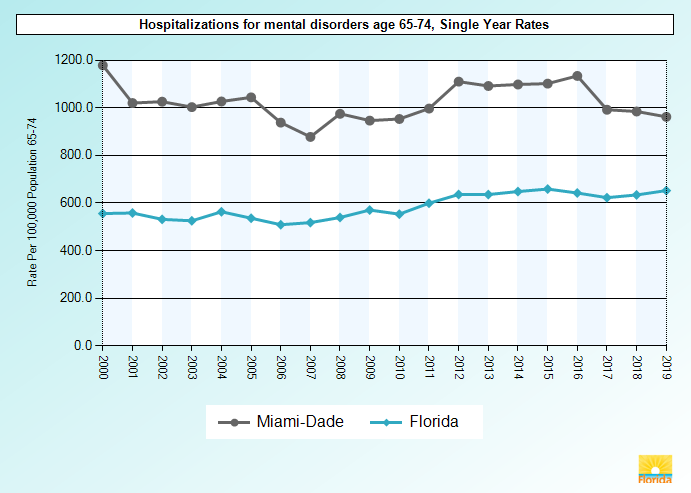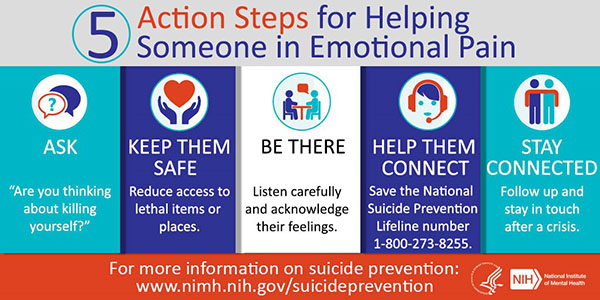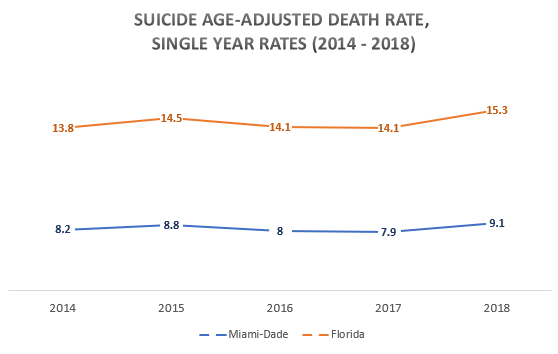In the United States, mental illnesses are among the most common health conditions. As defined by the Centers for Disease Control and Prevention, “mental health includes our emotional, psychological, and social well-being.” This affects the way we think and how we feel. Our mental health also helps us determine how we handle stress, how we relate to others, and make healthy choices. Mental health is important at every stage of life, from childhood and adolescence through adulthood.
People can experience different types of mental illnesses or disorders. Mental illnesses can occur over a short period of time or be episodic. This means it can be ongoing or long-lasting.
There are more than 200 types of mental illness. Please click here to learn more. Some of the main types of mental illness and disorders are listed here:
- Anxiety Disorders
- Attention-Deficit/Hyperactivity Disorder
- Disruptive Behavioral Disorders
- Depression and Other Mood Disorders
- Eating Disorders
- Personality Disorders
- Posttraumatic Stress Disorder (PTSD)
- Schizophrenia Spectrum and Other Psychotic Disorders
- Substance Use Disorders
Both our mental and physical health are equally important components to overall health. Mental illnesses, like depression, can increase the risk for various physical health problems. These health conditions include heart disease, stroke, and type 2 diabetes. The CDC also shares the presence of chronic conditions can also influence and increase the risk for mental illness. Overall, it is important to create healthy living environments that support good mental health which allow people to adopt and sustain a healthy lifestyle.
Source: https://www.cdc.gov/mentalhealth/learn/index.htm and https://www.cdc.gov/mentalhealth/learn/index.htm
Adolescent Mental Health
As defined by the Centers for Disease Control and Prevention (CDC) mental health in childhood means reaching child development and emotional milestones. During this time is when the child learns healthy social skills and how to cope when there are problems. Good mental health is important for children to have a positive quality of life. This helps them function well at home, in the school setting, and even in their communities.
The National Survey on Drug Use and Health Florida Results:
28%
of Florida high school students reported that they felt sad or hopeless almost every day for 2 or more weeks in a row so that they stopped doing some usual activities (2017).
13%
of Florida adolescents ages 12-17 reported that they had at least 1 major depressive episode (2017).
14%
of Florida high school students reported that they seriously considered attempting suicide (2017).
According to the CDC, by the age of 14 years old about half of all chronic mental illness begins and about three quarters of the cases occur by the age of 24 years old. Mental disorders among children are described as serious changes in the way children typically learn, behave, or handle their emotions. This can cause distress and problems getting through the day. A child may be diagnosed with a mental disorder when the symptoms start to become consistent and severe. These symptoms would interfere and cause issues with the child’s performance in school, at home, or even while playing.
The more common mental disorders that can be diagnosed in childhood include attention-deficit/hyperactivity disorder (ADHD), anxiety, and other behavior disorders.
It is important to note that child mental health illnesses and disorders can be managed and treated. Florida Health Charts reported in 2018 the number of children ages 1 to 5 years old in Miami-Dade County who received mental health treatment services was 100. This indicator shares the number of children who received in-home or community-based outpatient services, crisis services, or residential treatment. It is important to measure the number of children who receive these services because it builds resilience to prevent the severity, duration, and disabling aspects of children’s mental and emotional disorders.
Please visit the CDC to learn more about childhood mental disorders, symptoms, and treatment by clicking here. To learn more about other related conditions with concerns about children’s mental health, please visit here.
Older Adults
Depression is a true and treatable medical condition, not a normal part of aging. – CDC (2017)
There are a lot of misconceptions surrounding older adults and mental health. According to the CDC (2017), older adults are not only at an increased risk of developing depression but they also face many struggles with receiving treatment because of these misconceptions. For instance, there are healthcare providers that assume one’s symptoms are due to life events that occur as we age, resulting in one being misdiagnosed and left untreated. Older adults warning signs may also go unnoticed by family members as many assume their behavior is “normal” for their age.
Why is this important? According to FLHealthCharts “Mental disorders, when serious and untreated, can cause significant morbidity, reduced quality of life, numerous hospitalizations … Mood disorders are particularly important contributors to disability-adjusted life years lost and to years lived with disability”.
It is important to note, however, that despite these risks, hospitalizations for mental disorders for individuals over the age of 64 have declined over the years in Miami-Dade. In addition, mental health disorders can be treated in older populations. Today, providers and family members are listening more than ever to patient concerns and reacting appropriately when they think their loved ones are at risk for a mental health disorder.
For more information on how to identify warning signs in a loved ones, use this document: “10 Warning Signs Your Older Family Member May Need Help” . Additional resources can be found at the bottom of this page.
References:
- Centers for Disease Control and Prevention (2017). Depression is not a normal part of growing older. Retrieved from https://www.cdc.gov/aging/mentalhealth/depression.htm
- FlHealthCharts (2020). Hospitalizations for mental disorders age 65-74. http://www.flhealthcharts.com/charts/OtherIndicators/NonVitalIndNoGrpDataViewer.aspx?cid=9921
Suicide Prevention
Why Is This Important?
Suicide is the tenth leading cause of death in the United States and the eighth leading cause of death among those in Miami-Dade County. The CDC defines suicide as “death caused by self-directed injurious behavior” with an intent to die as a result of the action. Many factors contribute to suicide among those with and without known mental health conditions. A combination of individual, relationship, community, and societal factors contribute to the risk of suicide. Risk factors are those characteristics associated with suicide—they might not be direct causes. Between 1999 and 2016, suicide rates have increased in nearly every state. In 2017, an estimated 47,000 lives were lost to suicide. In the United States, millions of people injure themselves every year. Regardless of gender, the suicide incidences among the non-Hispanic White population is approximately two times higher than the non-Hispanic Black population.
Miami-Dade County’s suicide death rate has favorably begun to decrease since 2015 but increased to 9.1 in 2018. The most recent rates remain lower than Florida rates and select Peer Counties Average rates.
The Healthy People 2020 target for reducing the suicide rate is 10.2 suicides per 100,000 population. Miami-Dade County’s current rate of 9.1 suicides per 100,000 population has met the national health target.
Data from FLHealthCharts
Resources
National Suicide Prevention Lifeline
Call 1-800-273-TALK (8255);
En Español 1-888-628-9454
Free, confidential, available to everyone 24 hours a day, seven days a week.
SAMHSA’s National Helpline
1-800-662-HELP (4357)
Free, confidential, available to everyone 24 hours a day, seven days a week. English and Spanish.
Crisis Text Line
Text “HELLO” to 741741
Free, confidential, available to everyone 24 hours a day, seven days a week.
Veterans Crisis Line
Call 1-800-273-TALK (8255) and press 1 or text to 838255
People who are deaf, hard of hearing, or have hearing loss can
call 1-800-799-4889.
Free, confidential, for all veterans (regardless of VA registration), 24 hours a day, seven days a week.
- Age-Friendly Initiative: https://agefriendlymiami.org/
- Alliance for Aging (Programs & Services): https://allianceforaging.org/consumers/services-programs
- Fresh Start Miami: https://www.freshstartmiami.org/resources
- NAMI: https://namimiami.org/crisis-info/
- Thriving Minds: https://www.thrivingmind.org/
- 211 Resources on Miami Matters: http://www.miamidadematters.org/resourcelibrary/index/collection?id=63661877718696728
- Older Adult Warning Signshttps://acl.gov/sites/default/files/news%202017-03/10_Warning_Signs_Your_Older_Family_Member_May_Need_Help.pdf
- Coping with Mood Changes Later in Life https://secure2.convio.net/dabsa/site/SPageServer/?pagename=education_brochures_coping_mood_changes








